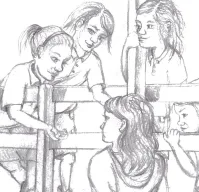The Children in Child Health: Negotiating Young Lives and Health in New Zealand
– Rutgers Series in Childhood Studies, 2020 –

Who are the children in child health policies and programming? How have we overlooked them, and why is it critical that we start paying attention to them now?
This book is about what children do: the unseen and underestimated practices of children who make lives for themselves in situations of poverty and inequality. While child health and wellbeing is the international focus of much political scrutiny and scholarly research, children are rarely taken seriously as social actors in academic or policy discussions of how their health is produced. This book challenges this invisibilisation of children’s activities, based on an ethnography of a marginalised community in Auckland, New Zealand, to argue that children’s experiences, interpretations, and practices matter. At ‘Tūrama School’, 8-12 year-old children harass peers who accept a stigmatised charity lunch, share their antibiotics with siblings, exploit a school clinic for social time and cut themselves with razors to express a social vulnerability that can’t be put into words. What children do, then, can powerfully structure the practices of the body, impact the effectiveness of policy interventions, and ultimately shape the production of children’s health and wellbeing.
These are also the stories of a group of children who feature regularly in public discourse as statistics and stereotypes, and about whom policies are debated and implemented, but whose voices as people are rarely heard. Amidst a national rheumatic fever epidemic Tūrama children imagine every sore throat as a lurking and inevitable death, and share their knowledge with wide-eyes and hushed voices. They cope with material poverty by proclaiming they’re not hungry, they care for sick and abused parents, and they find security in an unstable world through tactics of affection, coercion, or aggression. This is the social world that children collectively build and then dwell in together, and it shapes their lives and their health in ways invisible to policymakers thousands of kilometres away.
While pointing out important policy implications of children’s practices, this book simultaneously addresses the theoretical problem of how scholars and policy-makers alike can recognize and respond to children as social actors in their health. How can we understand children’s agency in analyses of disease, nutritional status or mental health, without implying that children are responsible for their health status, making their behaviours the targets of intervention, or detracting attention from structural inequities and injustices? To resolve this problem, I propose a coproduction framework which places children as participants in their health by positioning their activities in dialectical relationship with adults, the body, and social structures including the state, the institution, cultural ideologies, and the economy. I draw on theoretical insights from William Corsaro, Pierre Bourdieu, Chris Shilling, and Alan Prout on relationships between individuals—and individual bodies—and society to trace the processes through which Tūrama School children’s practices are produced from their embodied experiences within these wider structures. Significantly, I demonstrate how these practices matter not only because they pattern children’s experiences, but because they help to shape children’s health. How children negotiate health care, engage with risk, use pharmaceuticals, and what they choose to eat and what they reject are all practices which are not only enacted through bodies but help to make bodies.
This perspective of how children help to make their bodies brings a novel and contemporary biosocial approach to the current literatures on children’s health and social lives. Biosocial approaches, which consider the ways the biology and culture make each other, have been gaining traction within the social sciences in recent decades, but rarely in ways that incorporate children’s own cultural activities. A large, interdisciplinary body of research has considered questions of child health inequities from broader epidemiological and social perspectives, identifying the role of structural determinants of health but rarely attending to children’s own perspectives and activities. Meanwhile, the interpretive literature on child health mainly focusses on middle-class children in North America or West Europe and generally stops short of analysing how children’s practices may impact their biology. In the unique context of indigenous Māori and migrant Pacific children in a postcolonial nation, this book draws both literatures together to consider how children’s agency works together with the wider forces of society to coproduce children’s health. In doing so, this book will appeal to students and scholars working in the expanding space where the social sciences meet public health, as well as those in childhood studies, public policy, and psychology.
Finally, this book also offers methodological innovations for working with children. I explore collaborative ways of listening for, and recording children’s voice through embodied, relational and creative expressions, including researcher-participant drawing as an ethnographic method. I also consider the ethical complications wrought by relational research with children in an institutional setting and posit the concept of the ‘transparent guest’ as a researcher role. This book will therefore be useful for practitioners of child research, including those in education, psychology, social work, or the diverse subfields of childhood studies.
Reviews
“This is a beautifully written book that sheds light on children’s understandings of public health messages and practices. It is enlivened by the words of children, at times quirky and at other times heartrending, and by Dr Spray’s critical analysis which situates the children’s experiences within peer ecologies and the landscape of health and social inequities of Aotearoa, New Zealand.”
–Karen Witten, co-editor of Children’s Health and Wellbeing in Urban Environments
“At last, a book about child health that puts children at the center: as actors, as co-producers and most importantly as human beings. It should be compulsory reading for health professionals, social workers and anyone else anyone else who takes child health and wellbeing seriously.”
–Kate Hampshire, co-author of Young People’s Daily Mobilities in Sub-Saharan Africa: Moving Young Lives


1 Comment »